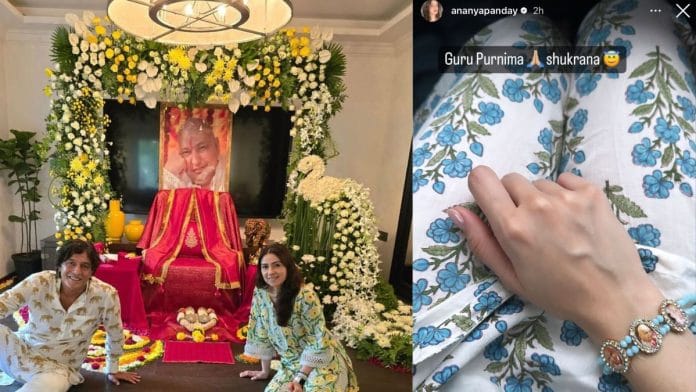Don’t just look down on the poor for blindly following godmen. Our celebrities too have their favourite babas. On Sunday, Guru Purnima, Bollywood actor Ananya Panday paid tribute to her ‘guru’ on Instagram flaunting a bracelet bearing his photograph. He’s a godman who went by the name ‘Guruji’—whisper networks on Reddit say he’s the go-to choice of the elites.
After the stampede at Hathras where at least 121 devotees of ‘Bhole Baba’ were killed, many took to social media to comment on how lack of education and illiteracy propels such blind faith. But then how do you explain this trend among wealthy, educated people? Even our politicians, sportspersons and of course, the Bollywood brigade are known to follow these self-styled ‘babas’.
Sachin Tendulkar is a disciple of the late Satya Sai Baba. Virat Kohli and Anushka Sharma took their daughter to the ashram of Neem Karoli Baba in Uttarakhand, who considered himself the avatar of lord Hanuman. Rishi Kapoor and Jacqueline Fernandez are known followers of Panday’s ‘Guruji’. Even producer Guneet Monga gave him a shoutout after her Oscar win last year.
Seeking spiritual guidance is nothing to be frowned upon. But the masses flocking to babas should also be read as a symptom of a larger problem—India’s crisis of faith. In the absence of strong religious communion, the godman industry has risen to bridge the gap between people and invisible gods. Many have become so powerful that they’re now part of the vote bank ecosystem, and police think twice before crossing them.
Also read: Six years ago I saw what happened at Bhole Baba’s ‘satsang’ venue. It was chaos
Stress, loneliness and religion
In every nook and corner of Punjab is a dera. People sit in satsangs and listen to sermons doled out by godmen. Haryana is no better. Back in Madhya Pradesh, Dhirendra Shastri of Bageshwar Dham attracts thousands, including the state’s top politicians, to his satsangs. Pradeep Mishra from MP’s Sehore gives him a tough fight. In Uttar Pradesh, Bhole Baba was little known, for he was godmen of the Dalits. But in villages across western Uttar Pradesh, Dalit households revered him. He went from proclaiming himself as an avatar of Shiv, to an avatar of Vishnu with a sudarshan chakra in his hands. And guruji is a favourite in Gurugram and Delhi.
But why are people flocking to godmen? There’s a pandemic—of depression, helplessness, and bitterness over growing income inequality. It’s easy to turn to babas, who offer quick fixes for a price. The controversial Nirmaljit Singh Narula, who was known as Nirmal Baba, has novel solutions for one’s ‘miseries’—eating masala dosa, rabri or pain puri.
The lack of access to mental health care in India has a role to play as well. At satsangs, frightened relatives of sick family members queue up in search of miracle cures.
But then again, in a religion-obsessed country like India, the rise of superstitious cults is not very surprising. After all, what is religion, if not the first cult; so ingrained in our sentimentality and way of living that any rational thought against its doctrine is offensive at best and blasphemous at worst?
Also read: ‘Who is Bhole Baba’, ‘what caused Hathras stampede’—and why was TV news so late to report
Criminalise godmen
The tragedy is that rationalists who try to stem the tide of superstition and blind faith are targeted. Dr Narendra Dabholkar, who had revived the rationalist movement in Maharashtra, was shot dead when he was out on a morning walk in 2013.
Dabholkar was a strong advocate for an anti superstition bill. The Maharashtra Prevention and Eradication of Human Sacrifice and other Inhuman, Evil and Aghori Practices and Black Magic Act was promulgated four days after his death. But it is largely unused, as reported by ThePrint. Only 250 cases were registered under the Act, and just over 1,000 complaints were made until 2022.
Seven states other than Maharashtra have some form of an anti-superstition law, but there is no similar legislation on the national level.
An advocate has now approached the Supreme Court and has filed a writ petition asking for stringent laws against superstition and black magic.
But laws will make no difference if media platforms continue to platform godmen on daily shows, manifestation remains a buzzword, and Bollywood celebrities wear accessories with photographs of godmen to protect them from the ‘evil eye’.
The cult of personalities is revered in India, we have a long-standing tradition of hero worship. Anywhere else in the world, a pathological narcissist who declares himself a godman will be given psychiatric treatment. But in India, they become godmen, healers, and guides.
Views are personal.
(Edited by Theres Sudeep)






